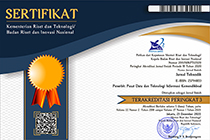ONLINE LEARNING BASED ON CONSTRUCTIVISM TO SUPPORT UNIVERSITAS TERBUKA DISTANT LEARNERS
DOI:
https://doi.org/10.32550/teknodik.vi.978Abstract
This article will elaborate on the possibility of implementing constructivism learning theories in designing an online learning tutorial program that will support and facilitate distance learning students to build better knowledge and skills. Universitas Terbuka (UT), an Indonesian state university that implements a distance learning system, conducts an online learning program to support the students’ learning process. The use of digital and network technology has significant effects on the human learning process. It changes the paradigm of learning and instruction. Recently, by using digital and network technology, students can learn without facing the restriction of time and place. In addition, the students can use various learning resources and materials to support their efforts in gaining knowledge and skills. The use of constructivism theory in online learning is expected to enable students to widen their knowledge and sharpen their skills while learning. This study uses a research and development approach to create a constructivist online learning program that can facilitate distance learning students' achieving their learning objectives.
References
Abuhassna, H., Al-Rahmi, W.M., Yahya, N., Zakaria, M.A.Z.M., Kosnin, A.B.M., & Darwish, M. (2020). Development of a new model on utilizing online learning platforms to improve students’ academic achievements and satisfaction. International Journal of Educational Technology in Higher Education, 17(1). https://doi.org/10.1186/s41239-020-00216-z.
Alanazi, A. (2019). A Critical Review of Constructivist Theory and the Emergence of Constructionism. American Research Journal of Humanities and Social Sciences (ARJHSS), 2(8). https://doi.org/10.21694/2378-7031.16018.
Aspillera, M. (2010). What Are the Potential Benefits of Online Learning? https://www.worldwidelearn.com/articles/benefits-of-online-learning/.
Bada, D., & Olusegun, S. (2015). Constructivism: A Paradigm for Teaching and Learning. IOSR Journal of Research & Method in Education (IOSR-JRME), 5(6), 66–70. https://doi.org/10.4172/2151-6200.1000200.
Borg, W.R., Gall, M.D., & Gall, J.P. (2007). Educational Research: An Introduction. In British Journal of Educational Studies (8 ed.). Pearson. https://doi.org/10.2307/3121583.
Chan, S. (2010). Designing an online class using a constructivist approach. Journal of Adult Education, 39(1), 26–39. https://eric.ed.gov/?id=EJ917397.
Dhull, I., & Sakshi, M. (2017). Online learning. International Education and Research Journal, 3(8), 32–34.
Dick, W., Carey, L., & Carey, J.O. (2015). The Systematic Design of Instruction (8 ed.). Pearson.
Dyer, K. (2015). Research Proof Points: Better Student Engagement Improves Student Learning.
Gilbert, B. (2015). Online Learning Revealing the Benefits and Challenges How Has Open Access to Fisher Digital Publications Benefited You? [St. John Fisher College,]. https://fisherpub.sjfc.edu/education_ETD_masters/303/.
Harrison, R., Hutt, I., Thomas-Varcoe, C., Motteram, G., Else, K., Rawlings, B., & Gemmell, I. (2017). A Cross-Sectional study to describe academics’ confidence, attitudes, and experience of online distance learning in higher education. Journal of Educators Online, 14(2). https://doi.org/10.9743/jeo.2017.14.2.3.
Heap, T. (2017). Five Benefits of Studying Online (vs. Face-to-Face Classroom). https://online.illinois.edu/articles/online-learning/item/2017/06/05/5-benefits-of-studying-online-(vs.-face-to-face-classroom).
Ramsook, L., & Thomas, M. (2019). Implementation of the Principles of Constructivism and Connectivism. International Journal of Contemporary Applied Researches, 6(5), 28–36. www.ijcar.net.
Stoeckel, M.R. (2020). Literature Review of Constructivism in Online Science Courses. 1–18. https://doi.org/https://doi.org/10.48550/arXiv.2007.07745.
Tanis, C.J. (2020). The Seven Principles of Online Learning: Feedback from Faculty and Alumni on its Importance for Teaching and Learning. IOSR Journal of Research & Method in Education (IOSR-JRME), 28(6), 66–70. https://doi.org/10.25304/rlt.v28.2319.
Rivalina, R. & Siahaan, S. (2020). Pemanfaatan TIK dalam Pembelajaran: Kearah Pembelajaran Berpusat pada Peserta Didik. Jurnal Teknodik Vol. 24 No 1, Juni 2020.
Downloads
Published
How to Cite
Issue
Section
Citation Check
License

This work is licensed under a Creative Commons Attribution-NonCommercial-ShareAlike 4.0 International License.
Please download and complete the Form, Copyright Transfer, and Ethics Statement Form. The following is provided at the time of submitting the text (Upload Additional Files):










